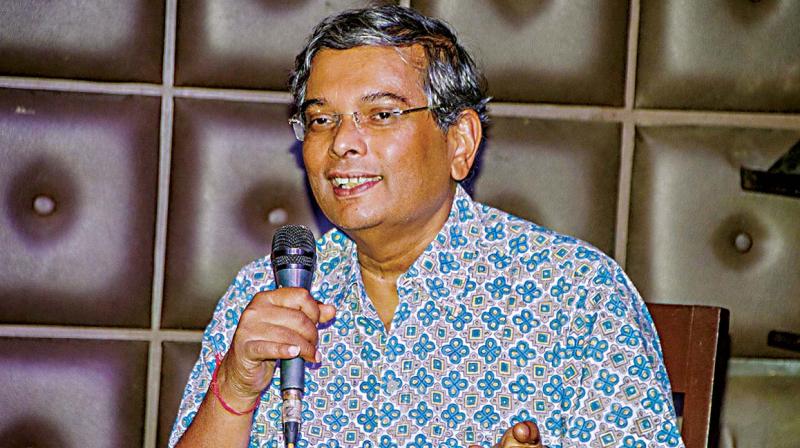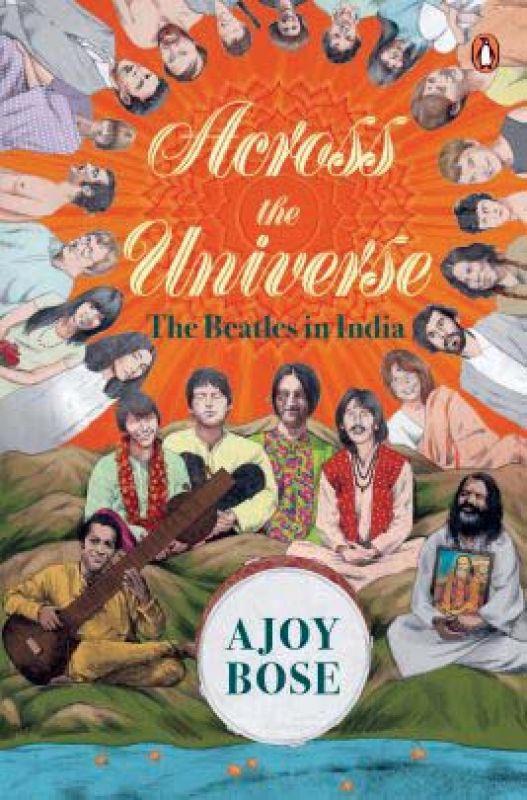Karmic connection: How India changed the Beatles' World

Psychedelics, meditation, Pandit Ravi Shankar: The Beatles’ journey to India has always been a subject of intrigue, so little is known about what really happened here. One thing’s for sure: nothing was the same afterwards. When Ajoy Bose began working on Across the Universe, he found a wealth of information that unravelled a fortuitous meeting of musicians and the series of events that followed. Even Pandit Ravi Shankar describes it as a “karmic connection,” he tells Darshana Ramdev
Bengaluru: On Saturday night, Bengaluru will revert, if only for a couple of hours, to the swingin' hub of rock 'n' roll it once was. Ajoy Jose's book, Across the Universe, a telling of the Beatles' journey through India, will release in Fava, UB City this evening and fans of the band have a few surprises in store! Long time Bengalureans will remember Biddu Appaiah, of Kung Fu Fighting fame and his erstwhile hippie avatar: Biddu and his friend, Ken, were Beatles impersonators with their band - The Trojans - “Biddu was Paul McCartney and Ken was George Harrison,” says Bose, who will give copies of the book to Ken, who is “something of a preacher now.”
Today, psychedelic artwork peers out at Today, psychedelic artwork peers out at you from every corner of Goa, emblazoned on clothes, musical instruments and "fusion" albums. So much so that to the average Indian, it's little more than a cliche, met with a sigh of resignation. Splashed across the cover of Ajoy Bose's Across the Universe, however, psychedelic flowers have found their place.
The 50th anniversary of the Beatles brought with it a brand new offering for the veteran political journalist. With four decades of experience, which included being bureau chief of the Sunday Times and working as the India correspondent for the Guardian, Bose's earlier works are the highly acclaimed For Reasons of State: Delhi Under Emergency and Shah Commission Begins. "I've written about foreign policy but never music. It was flattering too, it required my writing skills!” A book launch with a band was new territory for Ajoy Bose, accustomed as he is to “serious panel discussions!”

By the late 1960s, Paul McCartney, John Lennon, George Harrison and Ringo Starr were at the height of their fame - and growing mighty tired of it. "They were sick of just being the world's most famous popstars," Ajoy remarks, somewhat mystifyingly. "They were sick of touring and sick of meeting screaming teenage fans. They needed to reinvent themselves." Their meteoric rise to fame had demanded a heavy price and John Lennon, in particular, the most introspective of the lot, had had a particularly bad run-in with drugs.
"I found, as I began researching the book, that this was almost devised by fate. George's meeting with Ravi Shankar was almost coincidental and that's where it all began." George Harrison had heard other musician friends extoll the virtues of one sitar player, Pandit Ravi shankar. Intrigued, Harrison began to look for the sound of the sitar. He loved it so much that it made its way into Norwegian Wood, the first rock song to feature a sitar. "It was a big one and he had no idea how to play it, so he strummed it like a guitar," says Bose.
As it happened, a string on the sitar snapped. "They had to go to Asian music circles to get it fixed," says Bose. There, they met a friend of Pandit Ravi Shankar, who invited the musician to dinner with the Beatles. "That's how it all began and it's incredible how many people feel this was the working of fate. Even Ravi shankar himself suggest that here is a karmic connection. Either way, it's a very mysterious one," Bose remarks.
He found, as he set out to describe the Beatles' trip to Rishikesh, that he had stumbled upon an incredible tryst with the East, one that took the world's favourite band three years toe experience. "I don't think anybody has really explored this. One of the reasons is that most of the people who have written about the Beatles are not Indian. Nobody has really scrutinised what they did in India but there is a lot of material that I have put in perspective and arranged."
George Harrison would go on to become the world's most famous Hindu. As he sat by his dying mother's bed, he read her excerpts from the Bhagwad Gita. "He had a deep affinity to India, its music, it's culture. He referred to it as his home," says Bose. Sure enough, nearly every big city and tourist destination has a story of George Harrison, from his trip to Bengaluru to eat an Indian meal, to the time he arrived, incognito, at a club in Delhi.
Bose's research took him to Pattie Boyd, George Harrison's ex wife, who arrived in India with him when she was still a dewey eyed 22-year-old who had scarcely ventured out of her country. "She's a beautiful woman," Bose smiles. "She's the woman who has had the two most beautiful love songs written for her and even seeing at 75, I could understand why." The young couple went, growing increasingly more stunned, on what Bose refers to as a "cultural Odyssey." They visited the Ajanta and Ellora caves: "The beauty and sexuality of the goddesses really astounded them. They couldn't believe that gods and goddesses could be represented like this." They stayed in a houseboat in Srinagar and arrived at Benaras, all with their benevolent guru, Pandit Ravi shankar, in tow.
As the band continued its battle with drugs, one that John Lennon was quite evidently losing, Ramana Maharishi arrived in London to conduct a workshop on transcendental meditation. "They were very taken by him and decided to go stay at his ashram. That's when their manager and mentor died and they turned to him for comfort. He taught them Indian wisdom and they were very impressed with it." Bose then met with journalist Saeed Naqvi, who went to the ashram, posing as a devotee. "He came back and wrote his own account of what happened there as well and I met with his entire family, who had accompanied him!"
Luckily for Bose, the Beatles' journey to India was very well documented. "My main challenge was that most of the people who were around at the time aren't alive anymore." Instead, he dug out every interview the Beatles ever gave with regard to India. "Much of what's in the book is in their own words," Bose explains. "I look very much into their relationships, their personal lives and their inner struggles. Even as a fan of the Beatles, I had always felt there was a vacuum in terms of what they did in India. So this turned out to be a very rewarding experience."

